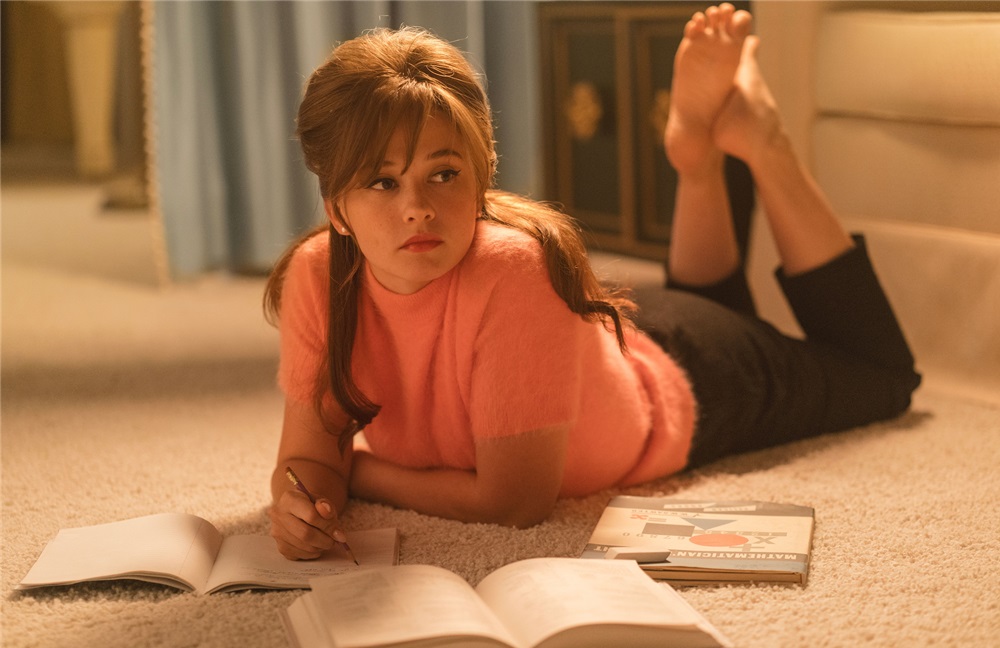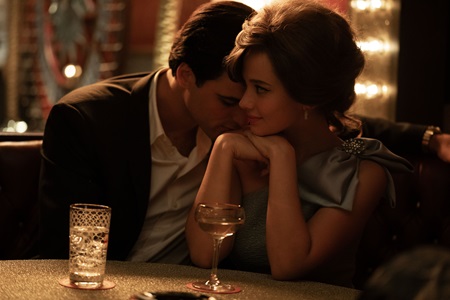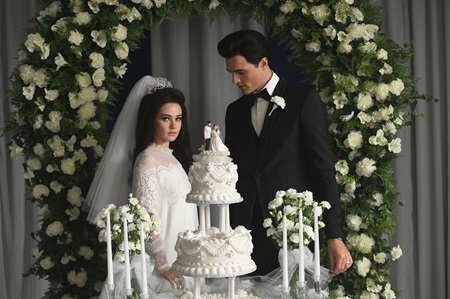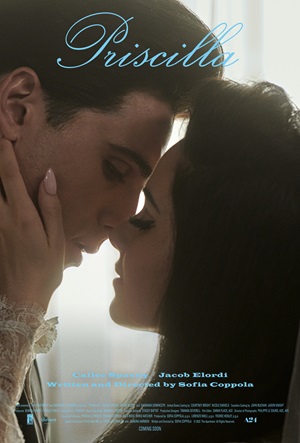
Priscilla (2023)
by Sara Michelle Fetters - November 2nd, 2023 - Four-Star Corner Movie Reviews
Sofia Coppola’s Priscilla is an Ethereal Emotive Whirlwind of Romantic Infatuation and Feminine Resolve
Priscilla is a vibe. It’s a viscerally emotive whirlwind that sweeps around the viewer with hurricane-like intensity. It’s a magically transportive exercise in style and visual ingenuity in which location, clothing, makeup, hairstyle, and music all delicately augment the internalized, fractured, fairy-tale romantic journey the main character finds herself going on. It is one of the best pictures of Sofia Coppola’s career, fitting so snuggly inside the director’s filmography, it’s as if she and only she was the one destined to bring Priscilla Presley’s story to the screen.
The most obvious point of comparison for Coppola’s adaptation of Presley’s 1985 memoir Elvis and Me (co-written with Sandra Harmon) is her ahead-of-its-time, still not-quite-successful 2006 drama Marie Antoinette. Her youth-centered take on the “let them eat cake” queen who’d eventually lose her head during the French Revolution was an anarchic explosion of modern music, period sets and costumes, and punk rock aesthetics that was as explosively alive as it was emotionally bewildering. The pieces never quite fit together, and as mesmerizing as the film could be in the moment, there was still something just slightly off about the execution that kept it from achieving lasting resonance.
This is not the case with Priscilla. Coppola achieves a lyrical dynamism while showcasing Presley’s story that’s enthralling. She takes the iconic image of Elvis and makes it human in a way no other filmmaker has before, from John Carpenter to Denis Sanders to Baz Luhrmann. She shatters chimeras and illustrates that what is on the other side of the looking glass isn’t all it’s cracked up to be, while still examining how character is shaped and courage sharpened inside a crucible of love, cruelty, forgiveness, passion, and suffocation beyond imagining.
Most of all, Coppola centers Priscilla Presley and makes her the focus of a story many think they’ve already heard and precious few know a solitary thing about. This is an ethereal dream that quickly accelerates into a haunting nightmare before shifting gears to eventually become a transformative burst of perseverance, self-expression, and humanistic understanding. Through it all, by allowing herself to be broken down and remade, Presley discovers who she really is and embraces the powerful woman she was meant to be, all of it with a Virginia Woolf–style, stream-of-consciousness grace a filmmaker as talented as Coppola excels in manufacturing.
The story begins in 1959 with Priscilla (Cailee Spaeny) being invited to attend a party at Elvis’ (Jacob Elordi) house on a US military base in Germany when she was a starstruck 14-year-old and he was, at 24, arguably the biggest music star in the world. It ends in 1973 with her walking out of Graceland with purpose and fortitude after letting him know she was filing for divorce. In between is a saga that’s a mixture of Alice in Wonderland and The War of the Roses, everything seen through the mirror of a young woman’s eyes as she realizes that the man she loves and the myth he’s striving to maintain are rarely — if ever — the same thing.
Nothing is shied away from or watered down, including the fact that the pair’s relationship began while she was barely in high school. Her infatuation, how she so willingly allows herself to become remade in exactly the image Elvis wants — giant hair, dark lashes, thick makeup, clothing that accentuates her diminutive stature yet would still be more appropriate for a person a decade older — is all made convincingly clear.
With minimal dialogue and exquisite physicality, Spaeny brings the audience into this world with stunning, almost invisible ease. We see her grow and evolve. We feel it every time she is struck, whether physically or metaphorically. We cheer during her moments of joy. We are with her as she lets Elvis’s pleas for forgiveness and absolution work. He is her husband. She is his wife. Why shouldn’t he be in charge? Sure, he is micromanaging everything about Priscilla’s life, forcing her into a form of grandiose bourgeois isolation that’s a borderline form of imprisonment — but isn’t this what she signed up for by marrying the “King of Rock and Roll”?
What’s even more remarkable is how Spaeny so deftly and astutely shows how Priscilla learns to be her own woman out of this subtle incarceration. I could feel her backbone strengthen and stiffen as the pair’s story evolved. There is a noticeably vibrant resolve that hides behind Priscilla’s eyes, and it becomes increasingly noticeable throughout this elegiac — yet still hopeful — melodrama. Spaeny’s performance is so daintily enormous, so alive, so richly layered and effortlessly complex, that there was never a moment I could look away from her, even had I wanted to try.
But the same goes for Priscilla on the whole. While this feminine gaze analyzes the fiction behind the illusion and the disquieting truth underneath the glamour, Coppola paints an incisive portrait of resilience that transcends gender specifics and heteronormative constraints. Priscilla Presley is as much a uniquely singular woman as she is every woman aspiring to be more than the simplified version of themselves society has predetermined. Her song is our song, and it’s one worth playing on repeat.
– Review reprinted courtesy of the SGN in Seattle
Film Rating: 4 (out of 4)







